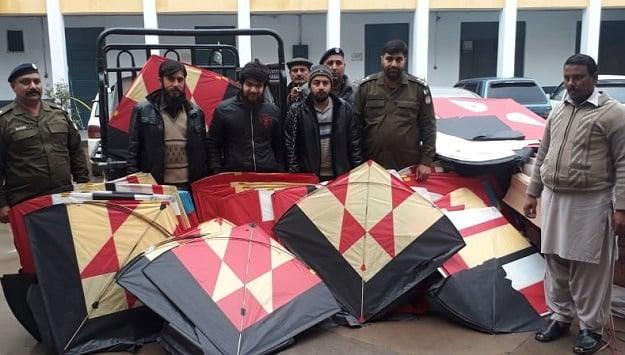LAHORE:
After decades of persistent efforts to curb kite flying, aerial shooting and unicycles, Lahore police turned to religious scholars for support and obtained an edict from Jamia Naemia declaring these dangerous activities un-Islamic.
The fatwa was shared with the public on Wednesday through an official booklet issued by Deputy Inspector General (DIG) Faisal Kamran. Addressing the media, Kamran, DIG Operations, Lahore, said that Islam unequivocally prohibits any act that endangers life.
The fatwa, written by Mufti Imran Hanfi and endorsed by Allama Dr Mufti Muhammad Raghib Hussain Naemi, head of Jamia Naemia, emphasizes the sanctity of human life in Islamic teachings. He categorically states that any act that endangers human life is un-Islamic.
“Any act that endangers human life is against Islamic teachings. These activities amount to suicide, which is strictly prohibited in Islam,” declared the fatwa, which arose at the request of a citizen, Muhammad Ali Naqshbandi, who he had approached clerics for guidance on the matter.
“Police will continue to take strict measures to curb these deadly activities,” DIG Faisal Kamran said at the press conference. “We also seek the cooperation of parents to ensure that their children are kept away from illegal and anti-Islamic activities,” he added.
Lethal fashion
All three activities have repeatedly proven to be fatal, with the use of sharp kite strings claiming several lives, aerial gunfire causing countless deaths and injuries, while single-wheeled vehicles remain a leading cause of accidents. traffic.
In January alone, police arrested 151 people for wheeling and registered 150 cases related to kite flying. In addition, 118 people were arrested by aerial gunfire. DIG Kamran stressed that the authorities would maintain their crackdown to deter such violations.
The issuance of the fatwa is part of the Lahore police’s latest strategy to address a problem that has persisted for more than two decades despite a zero-tolerance policy. The police have registered thousands of cases and carried out numerous crackdowns during this period, but rapes remain rampant.
In 2024, Lahore police registered an average of eight cases daily against kite flying and arrested a similar number of people. Between January and November 30, 2024, a total of 2,767 cases were registered, with the same number of arrests in Lahore alone.
Other regions of Punjab also reported major violations. 1,171 cases were recorded in Sheikhupura, 2,027 cases in Gujranwala, 388 in Gujrat, 1,011 in Rawalpindi, 2,866 in Faisalabad, 632 in Multan and 541 in Sahiwal.
persistent problem
The 2024 provincial data revealed the severity of the problem across Punjab. A total of 3,595 cases of aerial firing were recorded, resulting in the arrest of 5,412 people. Of them, 3,865 criminals were convicted and 2,816 challans were filed. In Lahore, 523 cases and 572 arrests were reported.
In the case of single-wheeled vehicles, 3,170 cases were recorded throughout the province, resulting in 3,365 arrests. Lahore accounted for a significant share, with 1,641 cases and 1,569 arrests. Statistics show that the problem has not diminished despite great efforts.
Police have tried multiple strategies – from community awareness campaigns to enhanced patrols – but with limited success. The recent reliance on religious teachings appeared to be an effort to reinforce police repression with moral and spiritual guidance.
By involving religious scholars, authorities hope to create a strong deterrent against these life-threatening activities. The fatwa aligns with Islamic principles and takes advantage of the respect and influence that clerics have in society to discourage people from engaging in these dangerous activities.
DIG Faisal Kamran reiterated the importance of collective efforts to eliminate these practices. “Parents must play their role in monitoring their children and discouraging illegal activities. Community cooperation is vital to ensure public safety,” he said.




